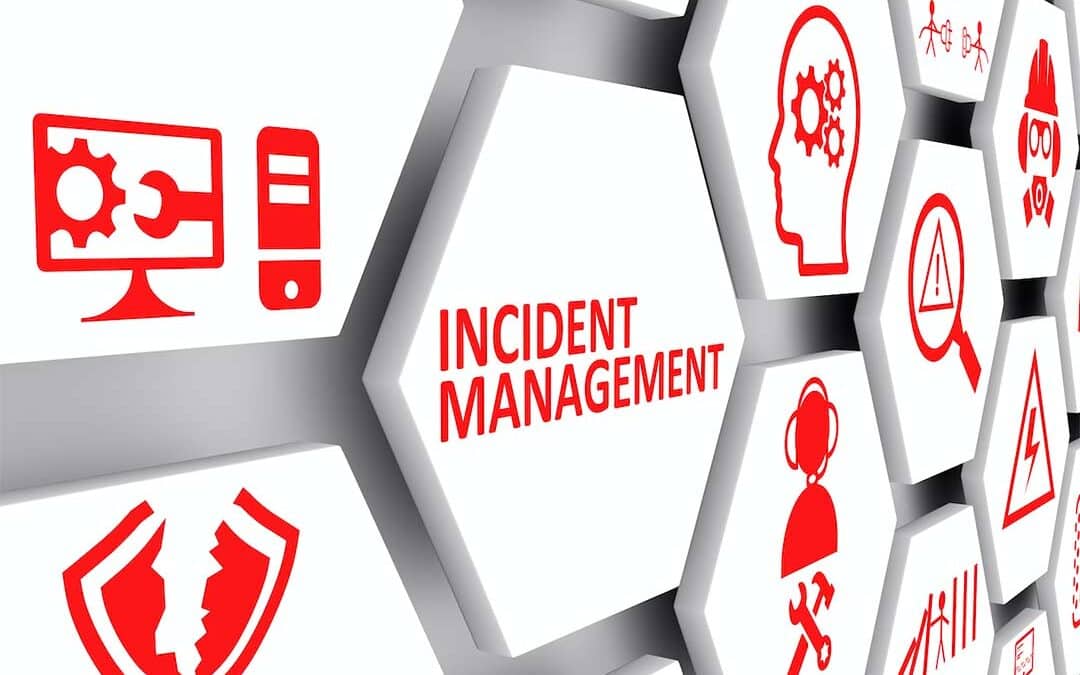For enterprises that rely on information technology (IT) and cybersecurity to keep their businesses running smoothly, interruptions aren’t a question of if but when. Cyber threats are ever-evolving, and disruptions can have significant consequences. Incident management is a critical component for enterprises looking to minimize disruptions and maintain workflows. With effective incident management practices, your organization can resolve interruptions in real time without damaging your team’s productivity.
What is Incident Management?
Incident management refers to the process of identifying, analyzing, and resolving disruptions or incidents that occur within an organization. More specifically, incident management is a core practice of IT service management (ITSM). An incident is an unexpected event that reduces or disrupts an IT service. These incidents can range from IT outages and cybersecurity breaches to natural disasters and other emergencies that impact business operations. The primary goal of incident management is to minimize the impact of these incidents on the organization and restore normal operations as quickly as possible.
The Process of Incident Management
IT incident management typically utilizes temporary workarounds to reestablish services while managed service providers or in-house IT teams investigate the incident. These temporary solutions help IT professionals buy time as they identify the cause of the incident and develop a permanent solution. IT incident management processes and workflows can differ depending on the IT organization, managed service providers, and the unique disruption involved.
In most cases, IT incident management workflows focus on potential incidents like a network slowdown. The incident is isolated to safeguard other critical IT systems and applications. The IT team fixes the issue or finds a temporary workaround to enable work to continue. Afterward, IT experts document the incident to monitor potential recurring incident trends.
Common Types of Incidents
IT Outages:
These incidents involve disruptions to IT systems or services, such as network outages, server failures, or application crashes.
Cybersecurity Breaches:
Cybersecurity incidents encompass unauthorized access, data breaches, malware infections, ransomware attacks, and other security breaches.
Natural Disasters:
Incidents caused by natural disasters, such as earthquakes, floods, hurricanes, or fires, can disrupt operations and require immediate response and recovery efforts.
Human Error:
Incidents resulting from human error, such as accidental deletion of critical data, misconfigurations, or improper equipment handling.
Security Threats:
Threats posed by malicious actors, including insider threats, social engineering attacks, phishing attempts, and other cyber threats.
Incident Management Best Practices
By following IT incident management best practices, organizations can minimize the length of an incident, speed up recovery time, and prevent potential issues in the future. To effectively manage incidents and mitigate their impact, organizations should adopt the following best practices:
Establish Clear Incident Response Procedures
Develop comprehensive incident response procedures that outline roles and responsibilities, escalation paths, communication protocols, and steps for incident identification, containment, eradication, and recovery.
Implement Incident Detection and Monitoring Systems
Deploy robust monitoring tools and security solutions to detect and alert potential incidents in real time. It includes intrusion detection systems (IDS), security information and event management (SIEM) platforms, endpoint detection and response (EDR) solutions, and network traffic analysis tools.
Create a Centralized Incident Response Team
Form a dedicated incident response team comprising individuals with expertise in IT, cybersecurity, legal, communications, and other relevant areas. This team should be available 24/7 to coordinate response efforts and collaborate with stakeholders during incident resolution.
Conduct Regular Training and Drills
Provide ongoing training and awareness programs to educate employees on how to recognize and respond to potential incidents effectively. Conduct tabletop exercises, simulations, and incident response drills to test the effectiveness of response procedures and improve preparedness.
Establish Communication Channels
Establish clear communication channels for reporting incidents internally and externally, including stakeholders, customers, partners, regulatory bodies, and law enforcement agencies. Maintain transparency and provide regular updates on incident status, progress, and resolution efforts.
Document and Analyze Incidents
Thoroughly document incident details, including the timeline of events, actions taken, findings, and lessons learned. Conduct post-incident reviews and root cause analyses to identify gaps in security controls, vulnerabilities, and areas for improvement to prevent future incidents.
Implement Continuous Improvement
Continuously review and update incident response plans, procedures, and technologies to adapt to evolving threats and organizational changes. Stay informed about emerging trends and regulatory requirements to enhance incident management capabilities.
Foster a Culture of Security
Promote a culture of security awareness and accountability throughout the organization. Encourage employees to report security incidents promptly, adhere to security policies and procedures, and actively participate in maintaining a secure environment.
Discover Incident Management with Cynergy Technology
Cynergy Technology is a leading provider of network security solutions. With our Managed Services, we can support your organization with incident management. We monitor the overall health of your infrastructure resources and handle the daily activities of investigating and resolving incidents. For instance, in the event of a component instance failure, Cynergy’s Managed Services initiates an immediate response, recognizes the failure, and launches the appropriate action to minimize or avoid service interruption. With over forty-two years of experience, Cynergy delivers consistent operations management and predictable results by following industry best practices. We provide state-of-the-art tooling and automation to increase your organization’s efficiency while reducing operational overhead and risk. To learn more about Cynergy’s incident management and Managed Services, contact our team of experts for a free consultation today!







